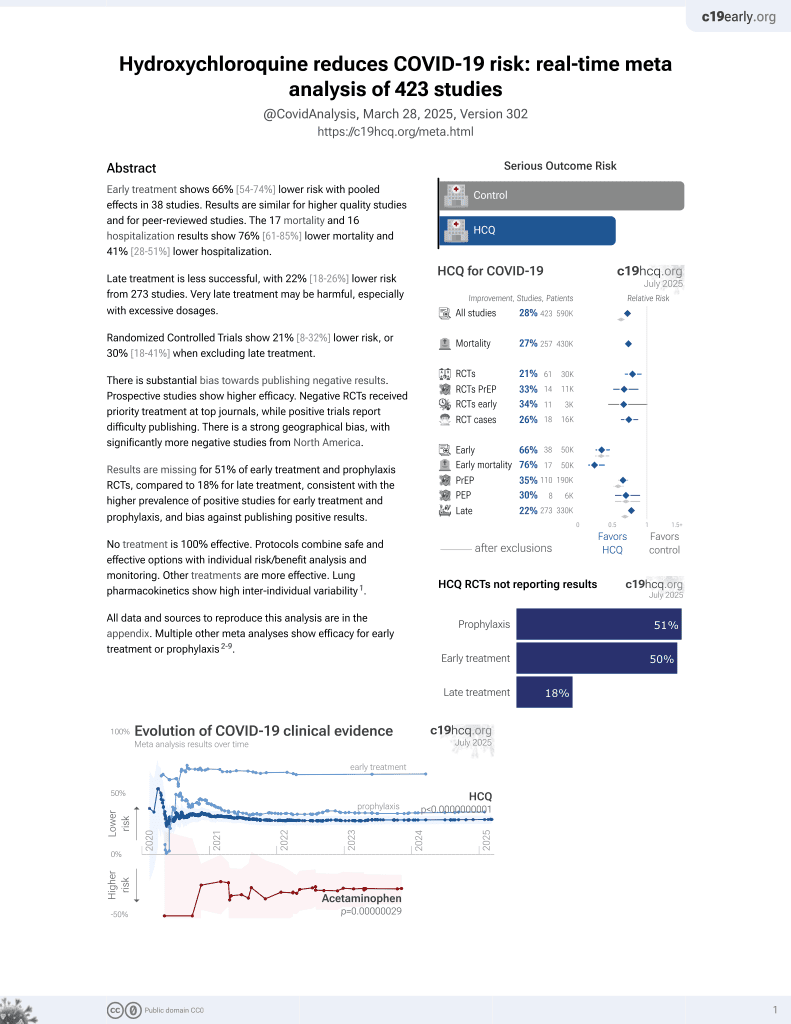Hydroxychloroquine and Azithromycin as a Treatment of COVID-19: Results of an Open-Label Non-Randomized Clinical Trial: Response to David Spencer (Elsevier)
et al., Preprint, Jul 2020
HCQ for COVID-19
1st treatment shown to reduce risk in
March 2020, now with p < 0.00000000001 from 423 studies, used in 59 countries.
No treatment is 100% effective. Protocols
combine treatments.
6,400+ studies for
210+ treatments. c19early.org
|
Updated meta analysis showing significant reductions in mortality and viral shedding. Mortality OR 0.53 [0.4-0.71] for clinical studies, 0.92 big data studies, 18,211 patients. Persistent viral shedding OR 0.47 [0.28-0.79], 4,540 patients.
10 meta-analyses show significant improvements with hydroxychloroquine for mortality1-4,
hospitalization1,
recovery5,
combined death/hospitalization/cases6,
cases7-9, and
viral clearance10.
Currently there are 37 HCQ for COVID-19 early treatment studies, showing 76% lower mortality [61‑85%], 67% lower ventilation [-710‑99%], 31% lower ICU admission [1‑53%], and 41% lower hospitalization [28‑51%].
1.
Landsteiner de Sampaio Amêndola et al., COVID-19 Infection in Rheumatic Patients on Chronic Antimalarial Drugs: A Systematic Review and Meta-Analysis, Journal of Clinical Medicine, doi:10.3390/jcm11226865.
2.
Risch, H., Early Outpatient Treatment of Symptomatic, High-Risk Covid-19 Patients that Should be Ramped-Up Immediately as Key to the Pandemic Crisis, American Journal of Epidemiology, kwaa093, 27 May 2020, doi:10.1093/aje/kwaa093.
3.
Risch (B), H., Response to: “Early Outpatient Treatment of Symptomatic, High-Risk Covid-19 Patients” and “Re: Early Outpatient Treatment of Symptomatic, High-Risk Covid-19 Patients that Should be Ramped-Up Immediately as Key to the Pandemic Crisis”, American Journal of Epidemiology, July 20, 2020, doi:10.1093/aje/kwaa152.
4.
Stricker et al., Hydroxychloroquine Pre-Exposure Prophylaxis for COVID-19 in Healthcare Workers from India: A Meta-Analysis, Journal of Infection and Public Health, doi:10.1016/j.jiph.2021.08.001.
5.
Prodromos et al., Hydroxychloroquine is effective, and consistently so used early, for Covid-19: A systematic review, New Microbes and New Infections, doi:10.1016/j.nmni.2020.100776.
6.
Ladapo et al., Randomized Controlled Trials of Early Ambulatory Hydroxychloroquine in the Prevention of COVID-19 Infection, Hospitalization, and Death: Meta-Analysis, medRxiv, doi:10.1101/2020.09.30.20204693.
7.
García-Albéniz et al., Systematic review and meta-analysis of randomized trials of hydroxychloroquine for the prevention of COVID-19, European Journal of Epidemiology, doi:10.1007/s10654-022-00891-4.
8.
Han et al., The efficacy and safety of hydroxychloroquine for COVID-19 prophylaxis and clinical assessment: an updated meta-analysis of randomized trials, Journal of Thoracic Disease, doi:10.21037/jtd-23-1043.
Raoult et al., 9 Jul 2020, preprint, 7 authors.
Abstract: 1
Hydroxychloroquine and Azithromycin as a Treatment of COVID-19: Results of an
2
Open-Label Non-Randomized Clinical Trial: Response to David Spencer (Elsevier)
3
Didier Raoult1,2, Matthieu Million1,2, Philippe Gautret1,3, Jean-Christophe Lagier1,2, Philippe
4
Colson1,2, Philippe Parola1,3, and Jean-Marc Rolain1,2
5
Affiliations :
6
1
IHU-Méditerranée Infection, Marseille, France
7
2
Aix Marseille University, IRD, AP-HM, MEPHI, Marseille, France
8
3
Aix Marseille University, IRD, AP-HM, SSA, VITROME, Marseille, France
9
Corresponding author: Didier Raoult, IHU - Méditerranée Infection, 19-21 boulevard Jean
10
Moulin, 13005 Marseille, France. Tel.: +33 413 732 401, Fax: +33 413 732 402; email:
11
didier.raoult@gmail.com
12
Key words: SARS-CoV-2; COVID-19; hydroxychloroquine; azithromycin
13
We thank the authors for the comments provided for our article (1-3), but we would like to
14
clarify key points for the story of this manuscript (4) that are critical in the context of COVID-
15
19 outbreak and for the perspective of this work. When COVID-19 starts around the world the
16
Editor-In-Chief of the Journal International Journal of Antimicrobial Agents (JM. Rolain)
17
asked colleagues (D. Raoult, PR. Hsueh, and S. Stefani) to launch a special issue in the
18
journal to create a real-time rapid debate around this emerging disease with special regards to
19
therapeutic options (5). Our preliminary paper (4) in this way was relatively trivial i.e
20
reported, in an emergency situation, a comparative analysis between a small group treated
21
with hydroxychloroquine and another small group not treated with hydroxychloroquine
22
showing a significant decrease of viral shedding after 6 days of therapy.
23
Surprisingly, despite the very small size of the group, the addition of azithromycin
24
made a difference on the endpoint we chose, which is the disappearance of the viral load in
25
the pharynx that is the only data that can be analyzed on a small group. Indeed, neither
26
mortality, nor the passage in intensive care unit, nor the duration of the treatment can be
27
evaluated on such a small group. This preliminary information was essential in our opinion
28
especially as it confirmed the preliminary in vitro and in vivo results against SARS-CoV-2
29
announced by the Chinese (6-8), also confirming previous in vitro reports on the anti-SARS-
30
CoV-1 coronavirus activity dating back to 2004 (9-12). This preliminary report paved the way
31
for work testing its reproducibility.
32
On the therapeutic level, the hydroxychloroquine + azithromycin combination was
33
found to be the most effective (4) consistent with in vitro synergistic antiviral activity
34
reported in our laboratory (13). Azithromycin had already, contrary to what one of the authors
35
says, been tested effectively on Zika (14,15), so we knew that it had an antiviral action. With
36
regard to our seminal paper on in vivo anti-SARS-CoV-2 activity of hydroxychloroquine (4),
37
we were subjected to unprecedented violence. I (DR) was asked to confess that I had a
38
relationship and a conflict of interest with Sanofi, which is laughable when you use generics
39
and you have had no relationship with the pharmaceutical industry at all at IHU (our center)
40
for 5 years. At the same time, the authors who published on remdesivir, for those we know,
41
the French, did not declare any conflict of interest in..
